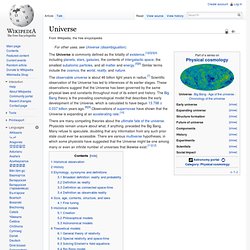

Universe. There are many competing theories about the ultimate fate of the universe.

Physicists remain unsure about what, if anything, preceded the Big Bang. Many refuse to speculate, doubting that any information from any such prior state could ever be accessible. There are various multiverse hypotheses, in which some physicists have suggested that the Universe might be one among many or even an infinite number of universes that likewise exist.[11][12] Historical observation XDF size compared to the size of the Moon – several thousand galaxies, each consisting of billions of stars, are in this small view. XDF (2012) view – each light speck is a galaxy – some of these are as old as 13.2 billion years[13] – the visible Universe is estimated to contain 200 billion galaxies. XDF image shows fully mature galaxies in the foreground plane – nearly mature galaxies from 5 to 9 billion years ago – protogalaxies, blazing with young stars, beyond 9 billion years. History Etymology, synonyms and definitions.
Solipsism. Solipsism ( i/ˈsɒlɨpsɪzəm/; from Latin solus, meaning "alone", and ipse, meaning "self")[1] is the philosophical idea that only one's own mind is sure to exist.

As an epistemological position, solipsism holds that knowledge of anything outside one's own mind is unsure; the external world and other minds cannot be known and might not exist outside the mind. As a metaphysical position, solipsism goes further to the conclusion that the world and other minds do not exist. Varieties[edit] There are varying degrees of solipsism that parallel the varying degrees of serious skepticism. [edit] Epistemological solipsism[edit] Epistemological solipsism is the variety of idealism according to which only the directly accessible mental contents of the solipsistic philosopher can be known. Methodological solipsism[edit] Methodological solipsism may be a sort of weak agnostic (meaning "missing knowledge") solipsism. Main points[edit] See also: Solipsism: Relation to other ideas (below) History[edit] Reality. Not to be confused with Realty.

Philosophers, mathematicians, and other ancient and modern thinkers, such as Aristotle, Plato, Frege, Wittgenstein, and Russell, have made a distinction between thought corresponding to reality, coherent abstractions (thoughts of things that are imaginable but not real), and that which cannot even be rationally thought. By contrast existence is often restricted solely to that which has physical existence or has a direct basis in it in the way that thoughts do in the brain. Reality is often contrasted with what is imaginary, delusional, (only) in the mind, dreams, what is false, what is fictional, or what is abstract.
At the same time, what is abstract plays a role both in everyday life and in academic research. For instance, causality, virtue, life, and distributive justice are abstract concepts that can be difficult to define, but they are only rarely equated with pure delusions. The truth refers to what is real, while falsity refers to what is not. Chaosbunny. On Truth & Reality: Philosophy Physics Metaphysics of Space, Wave Structure of Matter. Famous Science Art Quotes.